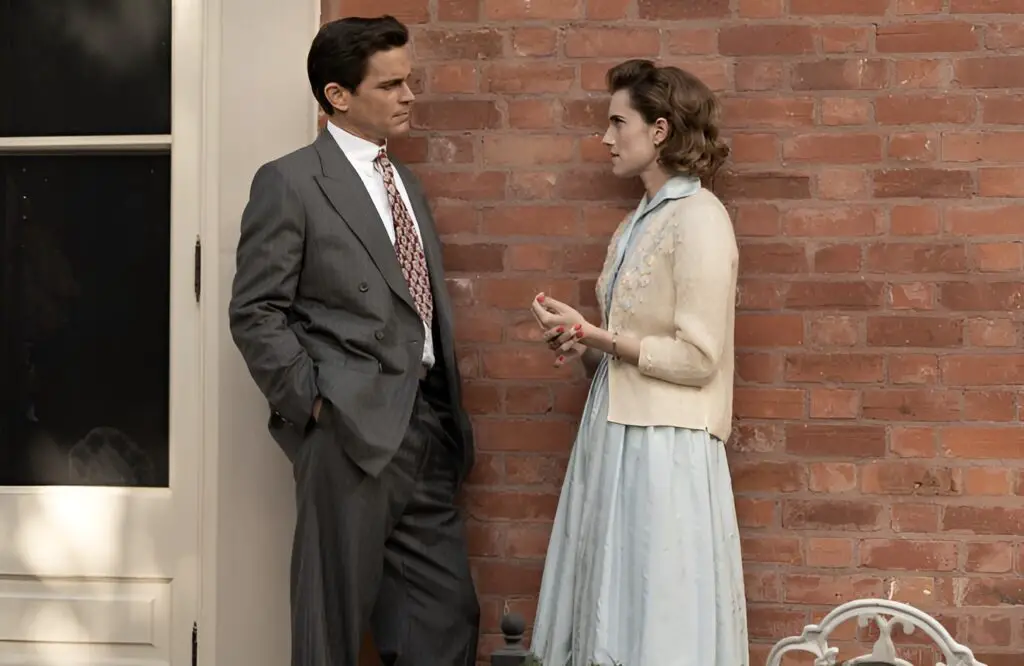In the gripping episode “Promise You Won’t Write,” the intensifying drama of “Fellow Travelers” reaches a new peak, intertwining the personal and political in 1950s America. This episode reveals the deepening complexities of Hawkins Fuller (Matt Bomer), a World War II veteran and State Department official, as he navigates the treacherous waters of McCarthyism while concealing his homosexuality.
The episode opens with Hawk’s covert efforts to protect Senator Smith, who faces threats from McCarthy’s allies to expose his family’s secrets, specifically concerning his son’s homosexuality. The intricate weave of lies and half-truths Hawk tells to safeguard those around him, including his paramour Tim Laughlin, a young congressional staffer, mirrors the broader societal duplicity of the era. Tim, meanwhile, faces his own crucible, torn between his love for Hawk and his deep-rooted beliefs, ultimately making a life-changing decision about his future.
Roy Cohn’s obsession with David Schine culminates in the notorious televised Army-McCarthy hearings, highlighting the era’s witch hunts and national paranoia. The episode poignantly portrays the personal cost of such public scandals, as lives and relationships are upended in the crossfire of political maneuvering.
Marcus, a gay African-American reporter, struggles with the era’s rampant segregation and racism, finding himself at a crossroads between his love for Frankie, a confident drag queen, and his burgeoning career at the Post. His journey underscores the multiple layers of marginalization faced by individuals like him during this tumultuous period.
“Pledge You Won’t Write” masterfully illustrates the tangled web of love, loyalty, and deceit that defined an era marked by fear and oppression. It’s a stark reminder of the personal battles fought and often lost in the shadows of larger historical narratives.
“Beyond Measure”: The Cost of Secrets in a Changing World

The subsequent episode, “Beyond Measure,” continues the riveting saga of “Fellow Travelers,” offering a window into the lives of its central characters as they grapple with the consequences of their choices against the backdrop of a society in flux.
Years have passed, and Hawk and Lucy have settled into a life that, on the surface, epitomizes the upper-middle-class dream, complete with two children. Yet beneath this veneer lies a cold, strained marriage, haunted by Hawk’s continuous lies and his secret liaisons. His son, Jackson, battles with depression and anger, symptomatic of a family unraveling under the weight of unspoken truths.
Tim, on his path to priesthood, finds himself perpetually torn between his religious convictions and his unresolved feelings for Hawk. His life, marked by denial and a desperate search for belonging, unfolds as a poignant tale of personal torment in an era that demanded conformity.
Meanwhile, Marcus, now caring for his ailing father, reflects on his life’s journey and the choices he’s made. His relationship with Frankie, though not currently active, remains a poignant reminder of the enduring yet often painful bonds formed in times of adversity.
“Beyond Measure” delves deep into the emotional and psychological costs of living a double life, revealing the profound impact of societal norms and expectations on individual lives. The episode underscores the collateral damage wrought by homophobia, not just on those directly affected but also on their families and loved ones. It paints a vivid picture of a time when personal and political spheres were inextricably linked, each leaving indelible marks on the other.


